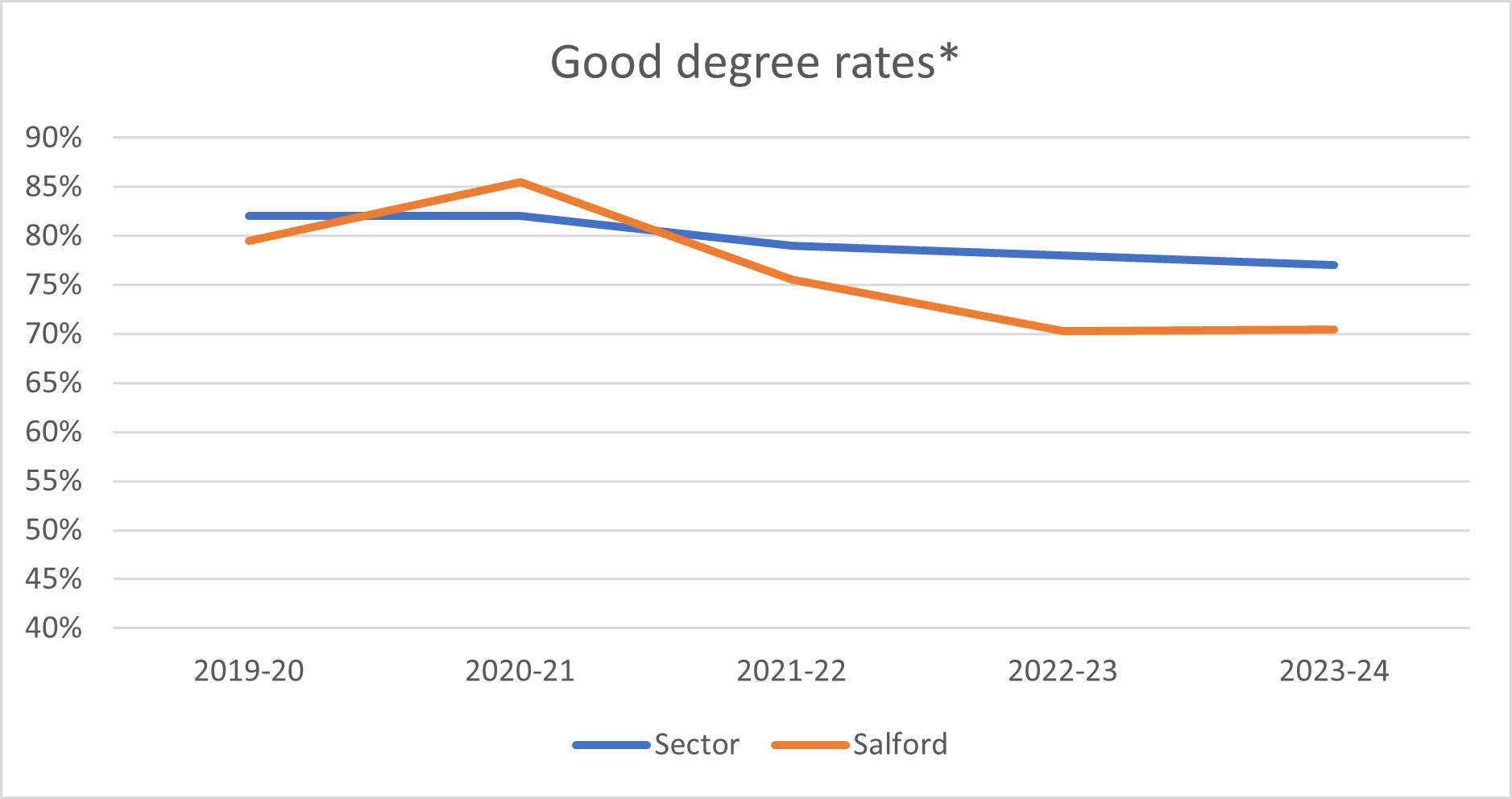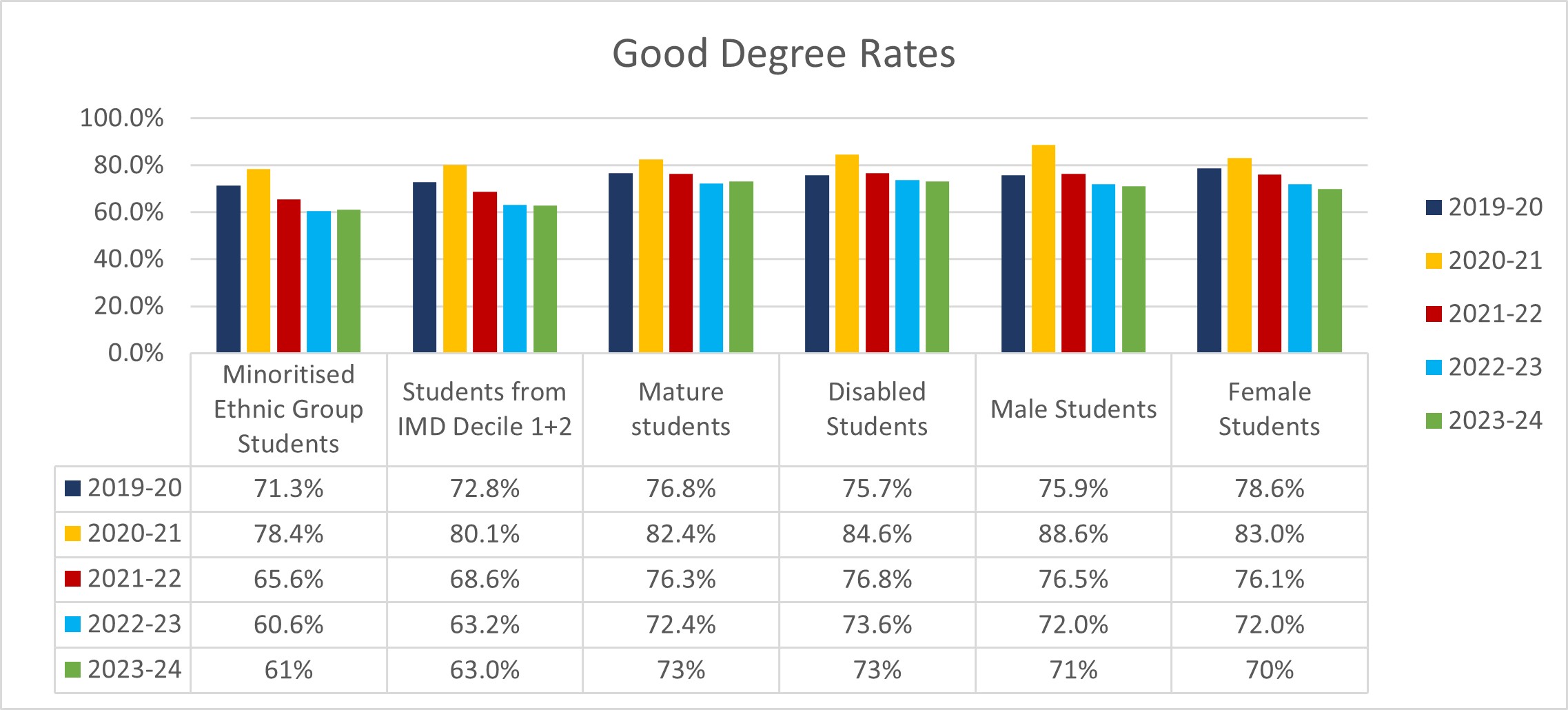Degree Outcomes Statement
The UK Standing Committee for Quality Assessment (UKSCQA) expects all Higher Education providers to publish a Degree Outcomes Statement that describes their ongoing commitment to maintaining academic standards and protecting the value and credibility of qualifications, and the degree classification system that underpins them, in the interests of students - past, present and future.
We review and analyse our degree outcomes on an annual basis for consideration by the University Academic Governance Committee. The analysis is used to inform the updating of the Degree Outcomes Statement, reflecting upon arrangements for teaching, learning and assessment of students, its classification algorithm, good practice, risks and challenges.
The Degree Outcomes Statement for 2024, below, was approved by the Council for publication.
Introduction
In keeping with the statement of intent on degree classifications (May 2019) of the UK Standing Committee for Quality Assessment’s (UKSCQA), the University of Salford is pleased to confirm that we share the UKSCQA’s commitment to the protection of the value of UK degrees. This statement sets out how we are fulfilling, and will continue to fulfil, this commitment.
The University of Salford has a strong, long standing track record in widening participation and has consistently exceeded its benchmarks for access and participation from groups traditionally under-represented in Higher Education. The University’s Access and Participation Plan is a core element of its mission to transform lives, stimulate discovery and to enable all students to realise their potential. The Degree Outcomes Statement demonstrates the University’s commitment to protecting the value of students’ degrees over time.
Institutional Degree Classification Profile
The University’s degree classification profile sets out the percentage of degree classes awarded over the last five years for undergraduate (level 6) degree programmes.
Unless otherwise stated, summary statistics include both Home and Overseas first degree (i.e. honours degree) students:
University of Salford compared to the Sector:
| 2019-20 | 2020-21 | 2021-22 | 2022-23 | 2023-24 | |
|---|---|---|---|---|---|
| Sector | 82% | 82% | 79% | 78% | 77% |
| Salford | 79% | 86% | 76% | 70% | 70% |
* “Good” degrees in this context are defined as first and upper second class honours awards
| 2019-20 | 2020-21 | 2021-22 | 2022-23 | 2023-24 | |
|---|---|---|---|---|---|
| Minoritised ethnic group students | 71.3% | 78.4% | 65.6% | 60.6% | 61% |
| Students from IMD Decile 1+2 | 72.8% | 80.1% | 68.6% | 63.2% | 63% |
| Mature students | 76.8% | 82.4% | 76.3% | 72.4% | 73% |
| Disabled students | 75.7% | 84.6% | 76.8% | 73.6% | 73% |
| Male students | 75.9% | 88.6% | 76.5% | 72% | 71% |
| Female students | 78.6% | 83% | 76.1% | 72% | 70% |
Shown above is a breakdown of degree outcomes by characteristic. Minoritised Ethnic and IMD 1+2 students (shown in the table) are limited to UK-domiciled students only. The University of Salford Access and Participation Plan details how the University is addressing awarding gaps.
Assessment and marking practices
The University’s Assessment and Feedback Policy sets out the principles that inform its approach to assessment, which is conducted in line with the Academic Regulations for Taught Programmes. These principles support assessment and marking practices that are inclusive and designed to enable success and support continuation.
All module and programme specifications are scrutinised by the Programme Validation and Review Panel to ensure that the assessment strategies encourage student engagement with each element of assessment and that they are aligned to learning outcomes. Marks are awarded against marking criteria directly related to the learning outcomes. Schools produce brief descriptors of level performance and ensure that any issues arising from the annual review of subject-specific performance descriptors and their relationship to the University’s descriptors are addressed through actions as part of the Programme Monitoring and Enhancement Process.
External Examiners provide independent, valuable contributions in assuring the quality of vital elements of the students' experience, to enable the University to ensure that high quality teaching, learning and assessment are developed and maintained. They play a crucial role in contributing to the academic integrity of our awards. This involves assuring the appropriateness of the standards of awards, the quality of assessment opportunities afforded to students and the soundness and fairness of assessment processes. External Examiners provide an independent and insightful perspective on the standard of students' performance compared with those on similar programmes in other UK universities.
Academic Governance
The Scheme of Academic Governance sets out the University’s governance framework across the different levels as specified within the respective terms of reference and constitution for Senate and its Committees.
As the academic authority of the University, Senate maintains the quality and standards of the awards of the institution and in so doing protects the value of the degrees we award. Its primary duty is to safeguard the academic integrity of the University and is the custodian of the University’s degree awarding powers. Through an annual quality report, Senate provides assurance to Council that academic governance is robust and effective for learning and teaching, the student experience, research and knowledge exchange activities.
Senate delegates responsibility for institutional oversight of the quality of programmes and standards of awards for all provision including collaborative programmes and partnerships to the Quality and Standards Committee (QSC). QSC is responsible for the University’s Academic Regulations for Taught Programmes and the policies and procedures within the Academic Handbook that support the academic quality assurance activities that underpin the University’s programmes.
Assessment Boards act with delegated authority on behalf of Senate in making decisions on marks, progression and awards for taught programmes. In making such decisions, Assessment Boards operate in line with the University’s academic regulations, related policies, and with any relevant course specific regulations and relevant PSRB requirements.
Degree outcomes at collaborative partners are subject to the quality assurance processes as described above. Where provision is delivered in more than one location, Joint Boards of Study are held to facilitate collaborative management, with the same external examiner covering all programme iterations. Moderation and verification of assessment are also integrated across all points of delivery to ensure outcomes are consistently benchmarked to the same standards.
The University’s Programme Monitoring and Enhancement Procedure is the mechanism by which programme performance is continuously monitored, with timely consideration of qualitative and quantitative data relating to key performance indicators (KPIs) and sector-recognised standards. Actions are implemented to address areas that do not meet baseline requirements for student outcome and institutional KPIs. These are monitored through the year by School Education and Standards Committees and the Senate Committees to ensure resolution.
Classification Algorithm
The University publishes the degree algorithm annually in Section 9 of the Academic Regulations for Taught Programmes which is made available to all students, staff and external examiners. The Honours classification of Bachelor awards is based on the weighted aggregate of the best 100 Credits at each of Level 5 (25%) and Level 6 (75%), grade boundaries are set at 10% intervals from 40% (Third Class) to 70% (First Class). Assessment Boards make awards on the basis of these boundaries with no bandwidth for borderline discretion or consideration of contextual factors.
Through routine monitoring of degree outcomes through the academic governance committees, the University noted a continued upward trend in the number and proportion of first class degree awards. This arose from a change to the degree algorithm in 2012 intended to address a disproportionately low number of students gaining first and 2:1 degree outcome. In response, Senate approved an adjustment to the grade boundaries to their current position for cohorts entering study from September 2016. The impact of this change can be seen for graduates completing their studies in July 2019 where the anticipated reduction in the proportion of First Class awards is evident. Detailed modelling of how further changes to the classification algorithm may affect outcomes was conducted on behalf of the Academic Regulations Sub-Committee, and Senate agreed that no further changes were needed to bring the institutional classification profile in line with sector norms. Outcomes for 2019 and 2020 confirmed that this decision was correct.
In response to the disruption caused by lockdown in March 2020 due to the Covid 19 Pandemic, Senate approved the introduction of ‘no detriment / safety net’ approaches to ensure that students would not be disadvantaged. As a result, in 2020/21, the proportion of good degrees, compared to the previous year, increased by 6.4% and the rates of both upper second- and first-class honours degrees rose above their sector averages. The University responded to this increase by reviewing the impact of the no detriment approach to the classification of its degrees. It modelled the classification data using the override mark and compared this to marks that would have been awarded without the no detriment approach. An intersectional approach to the data was also taken by Schools, looking at the performance of modules, not only on the basis of average pass rate, but student success based on type of assessment and student views. It was concluded that, alongside the no detriment approach to classification, a complex range of factors contributed to the rise in outcomes:
- the safety net that had been applied at level 5 in 2019/20.
- the changes in assessment methodology due to the remote delivery as a result of the pandemic.
- Research that provided evidence that the University’s safety net/no detriment approach in 20-21 had been generous in comparison to the sector.
- The potential for unconscious bias to award slightly higher marks than usual in recognition of the extremely difficult circumstances in which students in practical subjects produced their assessed work, as well as their resilience and ingenuity.
In the light of these findings, the University correctly anticipated that there would be a reduction in the number of first and good degrees awarded in subsequent years, where no further no detriment approaches were applied. As noted in the tables above, the number of both Good Degrees and Firsts has now decreased, returning to a profile similar to the 2018/19 (the last complete pre-pandemic year).
Teaching Practice and Learning Resources
To support innovation and development in academic practice pedagogy, the University committed to a dedicated Learning Teaching and Enhancement Centre (LTEC) in 2021. LTEC is core to supporting the University’s vision to develop authentic learning and teaching practitioners, through a broad range of scholarship, awards, and continuing professional development in relation to academic practice. All University staff are expected to continuously develop their professional practice. A clear Academic Career Framework provides staff with structured development in three key areas: teaching and learning, research and enterprise and industry collaboration. Aligned to the UK Professional Standards Framework, early career academics have a clear path to demonstrating the indicators of success and impact leading to teaching excellence.
A rigorous process is in place to ensure professional development aligns to the Advance HE Professional Standards Framework. Currently (2023-2024), 74.75% of full-time academics hold the Award of Fellow or above, an increase of 2.6% on previous year (HESA data 2023). Awards for 2022-23 stand at 501 FHEA, 56 SFHEA and 1 PFHEA (for core teaching staff). All staff joining Salford must complete the PGCert in Academic Practice, and the University also had 3 National Teaching Fellows (2022-23 HESA), and was awarded a Collaborative Award for Teaching Excellence in 2024.
The University is working on a number of initiatives to support learning and teaching, including working closely with the Students’ Union to tackle loneliness, a key factor in student success; supporting students to pass modules first time; and introducing inclusive assessment principles which form part of every programme to support progression.
Risks and Challenges
The University recognises the sector-wide risks to the reputation of UK HE through grade inflation and as described above is committed to maintaining degree outcomes and avoiding inflation.



